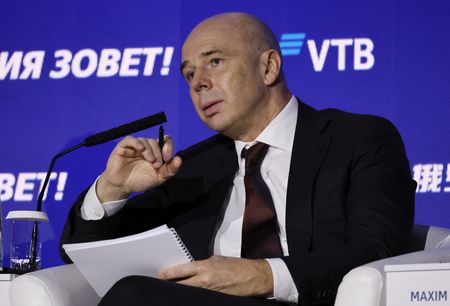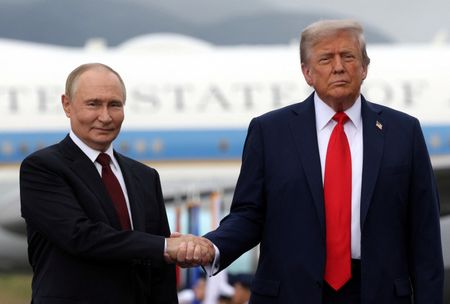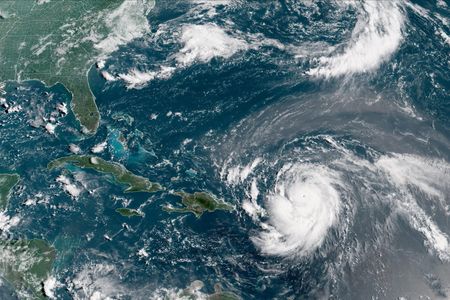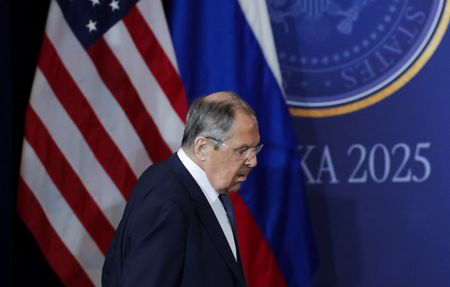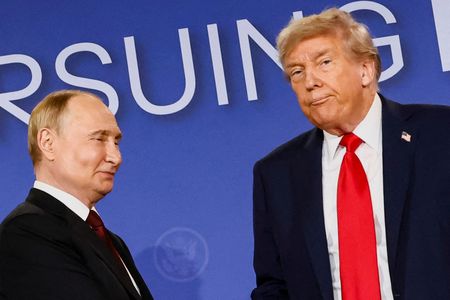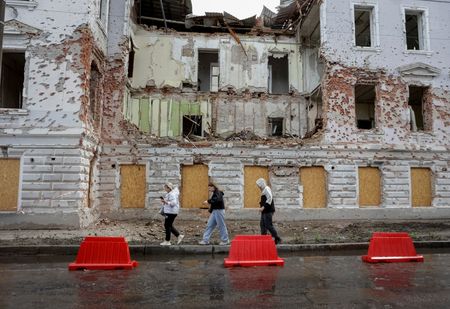By Darya Korsunskaya, Gleb Bryanski
MOSCOW (Reuters) -Russia’s finance ministry raised the 2025 budget deficit estimate to 1.7% of gross domestic product (GDP) on Wednesday from 0.5% after reducing the energy revenues forecast by 24% due to expectations of a prolonged period of low oil prices.
The ministry lowered the 2025 oil and gas revenues forecast to 8.32 trillion roubles ($101.47 billion) or 3.7% of GDP from 10.94 trillion roubles or 5.1% of GDP. It also increased the 2025 spending plan by 830 billion roubles.
Russia already hiked state spending on national defence by a quarter in 2025 to 6.3% of gross domestic product (GDP), the highest level since the Cold War, as the country continues its war in Ukraine, now in its fourth year.
Finance Minister Anton Siluanov said defence spending will not be touched.
“The budget priorities remain unchanged. These are social support for citizens, funding for the defence and security of the state, support for families of participants in the special military operation,” he said in comments on the increase.
The increased forecast, which took place just before the long May Day and Victory Day holidays when many Russians head to the countryside and were unlikely to take a notice of the news, exceeded analysts’ expectations of a 1.5% of GDP deficit.
Many analysts believe that going forward the government will have no other choice but to hike taxes, reduce some sensitive social spending and go on a borrowing spree if it wants to balance the future budgets without cutting the spending on defence.
Russia raised some key taxes this year, including the socially sensitive personal income tax and the corporate profit tax. Russian President Vladimir Putin sees balanced budgets, low debt and taxes as his key achievements in 25 years in power.
ESCALATION OF TRADE WARS
Solid state finances had helped Russia to weather the global crises before but risks of the global turbulence this year are exacerbated by the rising costs of the war in Ukraine and Western sanctions.
The slowdown of the global economy as the result of trade wars is hitting demand for oil and pushing down its price, which fell by more than 11% in April.
The announcement by the finance ministry followed a revision of the average price of oil used in 2025 budget calculations to $56 per barrel from $69.70 previously, but Siluanov insisted the spending plans will not be affected.
“Everything planned in the budget, including the implementation of national development goals, will be carried out regardless of external conditions and factors,” he added.
The economy ministry published its high-risk forecasts for the first time also on Wednesday, where it said that international trade wars, triggered by the United States’ protectionist policies, pose a key risk to the Russian economy.
In this scenario economic growth in Russia is expected to be 1.8% in 2025, compared with 2.5% in the base scenario, which most economists consider too optimistic. The Russian economy grew by 4.3% last year.
“The scenario assumes an escalation of trade wars and a more significant slowdown in the global economy, which will reduce global demand and prices for oil and other traditional Russian export commodities,” the economy ministry said.
Siluanov also wants to save more oil revenues in a reserve fund and create a safety cushion during a period of global turbulence by lowering the so-called “cut-off” price of oil, above which all energy revenues are set aside for a rainy day.
($1 = 81.9955 roubles)
(Writing by Gleb Bryanski; Editing by Sandra Maler and Marguerita Choy)

